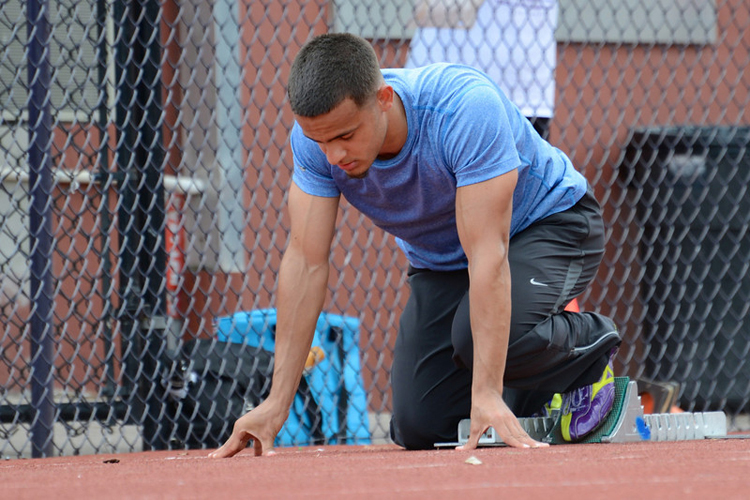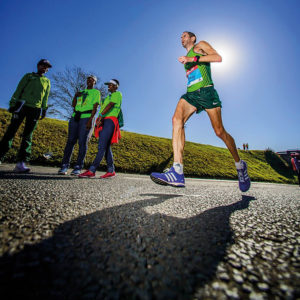
While diabetes needs constant management, it’s still totally possible for those with the condition to compete an elite level. Sir Steve Redgrave proved it in rowing; now Dannish Walker-Khan is hoping to do something similar on the track.
The U23 European 4x100m champion was diagnosed as having type 1 diabetes as an 11-year-old. But, as he tells Men’s Running, it hasn’t held him back from dreaming big…
How did you find out you were diabetic? And how did you feel upon hearing the news?
I was 11 years old, in year 7 at school, and I kept falling asleep in my lessons, needing to go to the toilet and drinking loads of water. I got sent home from school because of it, and my mum new something was up so she took me to the doctor. That’s when they told me I had type 1 diabetes.
When I found out, I was quite scared because the week before I’d watched Coronation Street, and one of its characters had died from diabetes. So I was, like, does this mean I’m going to die? Then I learned that Sir Steve Redgrave is a diabetic and so are other sports people, so I realised I could still do sport to a high level.
How does having type 1 diabetes affect your training?
We train at 9.30am every day, and my condition means I have to eat about two hours beforehand. So at 7.30am I have to eat a carbohydrate-based breakfast, which is not ideal for a sprinter as you ideally want quite a lot of protein and a few less carbs, but that’s not an option for me. I always have to do it two hours before, which means that one or two hours into the session I start to lose energy, so I have to top up on carbohydrate snacks during the session – things like bananas or cereal bars.
As soon as I finish training, I have to have another meals with quite a lot of carbs again – 60 or 70 grams – and a bit of protein as well. You have to be strict with your mealtimes to not have a ‘hypo’ [hypoglycaemia: a deficiency of gluscose in the blood stream].
When you eat a lot of carbs, it’s hard to stay lean. It’s hard for me to get those bottom abs! But it’s not too bad, really, as long as your disciplined with your training.
Do you think there are any common misconceptions about diabetes?
When you tell people you’re diabetic, a lot of people say: “Aren’t you supposed to be fat?” But with type 1 diabetes, it’s genetic so it’s not about being unfit or eating too much sugar. It comes to you whether you like it or not.
But I always like to say: diabetes has to live with you; you don’t live with diabetes. As long as you go about doing your own thing, the diabetes can just follow. If you let the condition control you, you’re always going to be thinking you’re inferior.
Is managing the condition difficult when you travel abroad to international tournaments?
When it’s an international event, it’s normally not too bad because it’s usually only three to five days in duration. You can pack the medication for the week, and the doctors on the team always have glyco gel in case you have a hypo.
When you go on a training camp for two months at a time, however, that’s a bit harder. I can only go to the doctors and get a prescription for a month, which means the second month I don’t have enough medicine, so I have to go to Walmark to buy a gluscose metre. They use different units, so I have to convert it. It’s quite a lot to remember.
Turning our attention to sprinting, what advice would you give to anyone trying to boost their top-end speed?
Do reps of 150m or less. And go for it at 95% of your maximum, with full recoveries. Try four in a session. That’ll help with your kick. But you can’t just do one session: you need to do it consistently over a few months.
We understand you’re trained by Lindford Christie. What’s it like to be coached by a legend?
It’s great. I’ve been coached by Lindford Christie for six years. He has so much experience: any situation you go to, he’s been in that situation. Sometimes, it’s not even on the track – tt could just be life management. There are loads of great athletes in the group, too, such as James Ellington who helps me a lot. It’s a really good environment to learn in.
What are your short-term and long-term sprinting goals?
Having run for Britain at U20 and U23 level, I now want to make the senior teams. So my aim is to do the World Relays early next year and then hopefully the World Championships in London – or get as close to the qualifying time as I can. Then my main aim is to get to the 2020 Tokyo Olympics.
Follow Dannish on Twitter and Instagram
What is diabetes?
There are 3.5 million people diagnosed with diabetes in the UK and an estimated 549,000 who have the condition, but don’t know it.
Diabetes is a lifelong condition that causes a person’s blood sugar level to be too high. There are two main types of diabetes:
- Type 1 diabetes, where the body’s immune system attacks and destroys the cells that produce insulin.
- Type 2 diabetes, where the body doesn’t produce enough insulin, or the body’s cells don’t react to insulin.
For more information on diabetes, visit: diabetes.org.uk






